Quotes & Sayings About Understanding With Images
Enjoy reading and share 40 famous quotes about Understanding With Images with everyone.
Top Understanding With Images Quotes
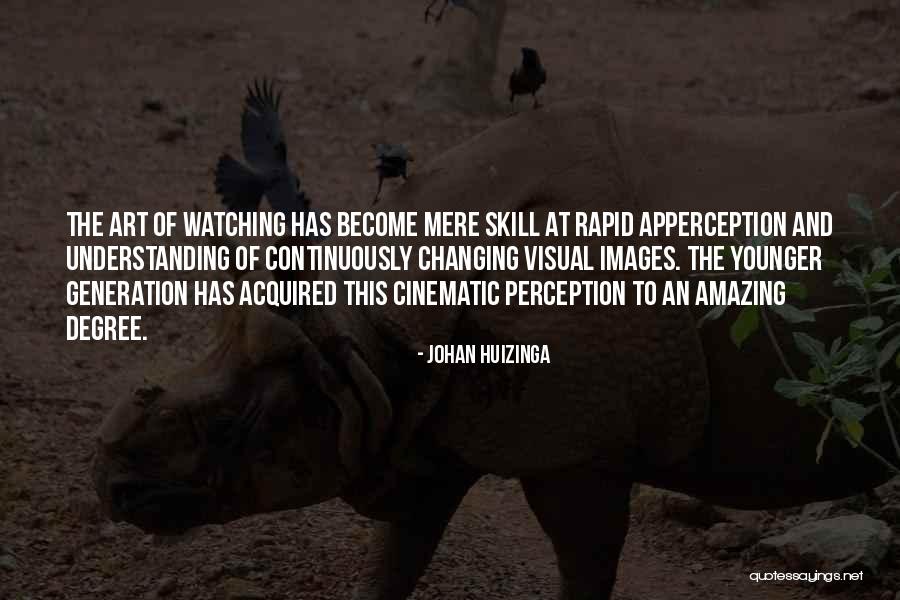
The art of watching has become mere skill at rapid apperception and understanding of continuously changing visual images. The younger generation has acquired this cinematic perception to an amazing degree. — Johan Huizinga
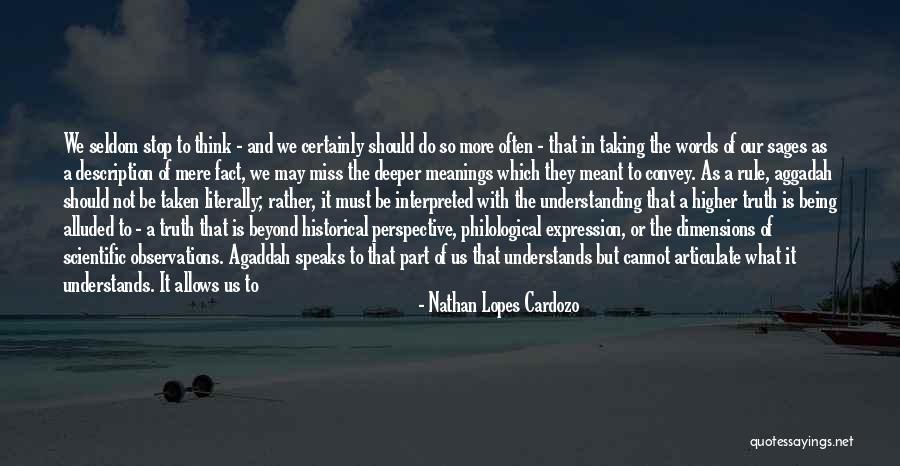
We seldom stop to think - and we certainly should do so more often - that in taking the words of our sages as a description of mere fact, we may miss the deeper meanings which they meant to convey. As a rule, aggadah should not be taken literally; rather, it must be interpreted with the understanding that a higher truth is being alluded to - a truth that is beyond historical perspective, philological expression, or the dimensions of scientific observations. Agaddah speaks to that part of us that understands but cannot articulate what it understands. It allows us to go beyond the realms of the definable, perceivable, and demonstrable. In this sense, aggadah is a form of religious metaphor, a mirror that enables us to form mental images of the indescribable. — Nathan Lopes Cardozo
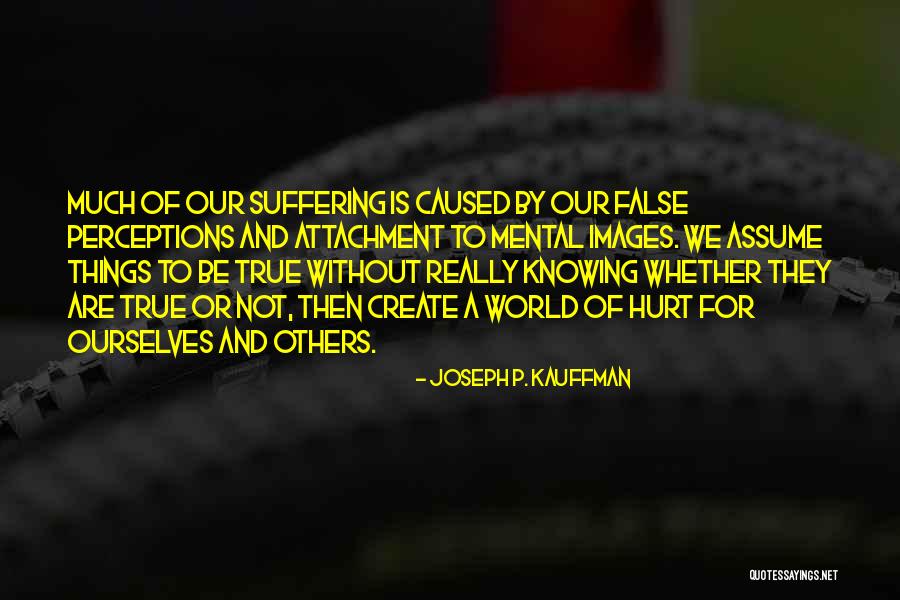
Much of our suffering is caused by our false perceptions and attachment to mental images. We assume things to be true without really knowing whether they are true or not, then create a world of hurt for ourselves and others. — Joseph P. Kauffman
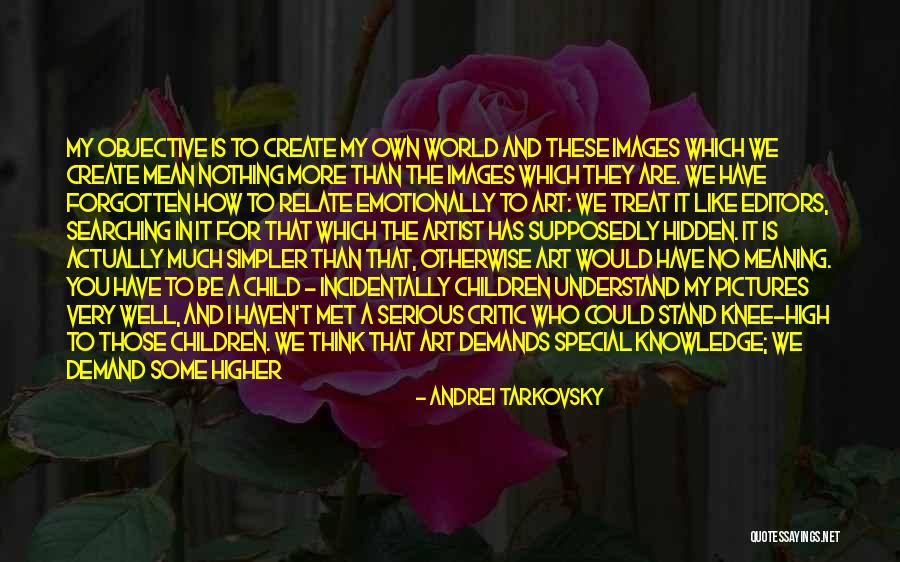
My objective is to create my own world and these images which we create mean nothing more than the images which they are. We have forgotten how to relate emotionally to art: we treat it like editors, searching in it for that which the artist has supposedly hidden. It is actually much simpler than that, otherwise art would have no meaning. You have to be a child - incidentally children understand my pictures very well, and I haven't met a serious critic who could stand knee-high to those children. We think that art demands special knowledge; we demand some higher meaning from an author, but the work must act directly on our hearts or it has no meaning at all. — Andrei Tarkovsky
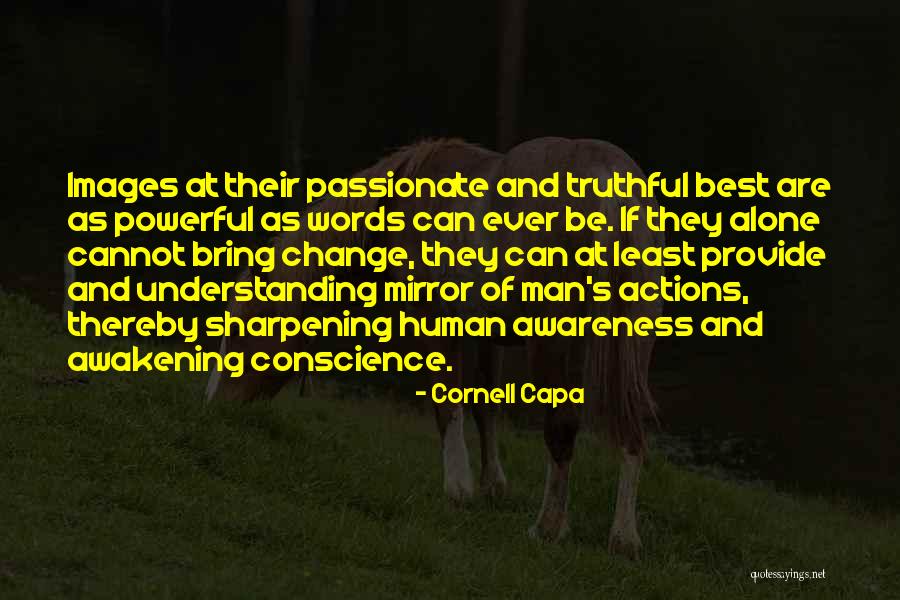
Images at their passionate and truthful best are as powerful as words can ever be. If they alone cannot bring change, they can at least provide and understanding mirror of man's actions, thereby sharpening human awareness and awakening conscience. — Cornell Capa
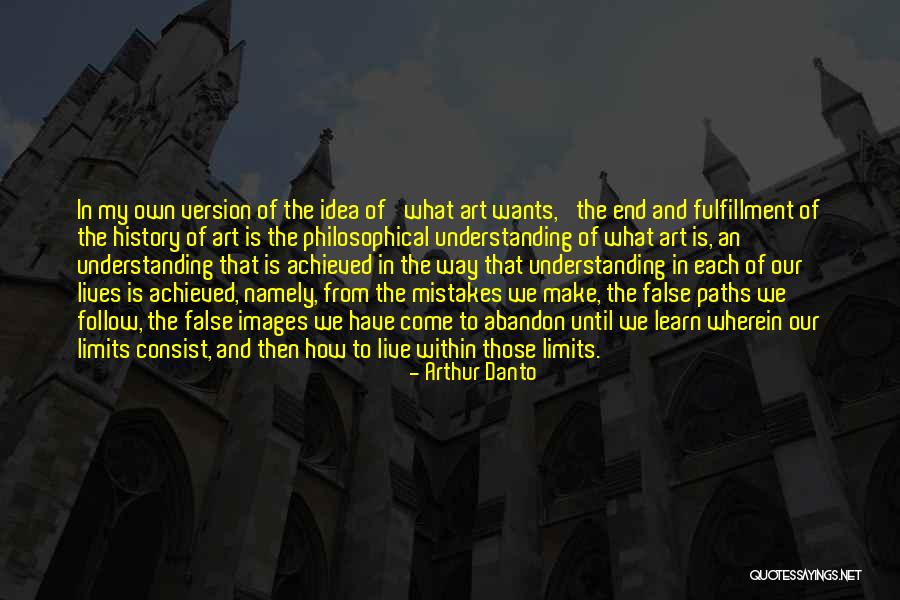
In my own version of the idea of 'what art wants,' the end and fulfillment of the history of art is the philosophical understanding of what art is, an understanding that is achieved in the way that understanding in each of our lives is achieved, namely, from the mistakes we make, the false paths we follow, the false images we have come to abandon until we learn wherein our limits consist, and then how to live within those limits. — Arthur Danto
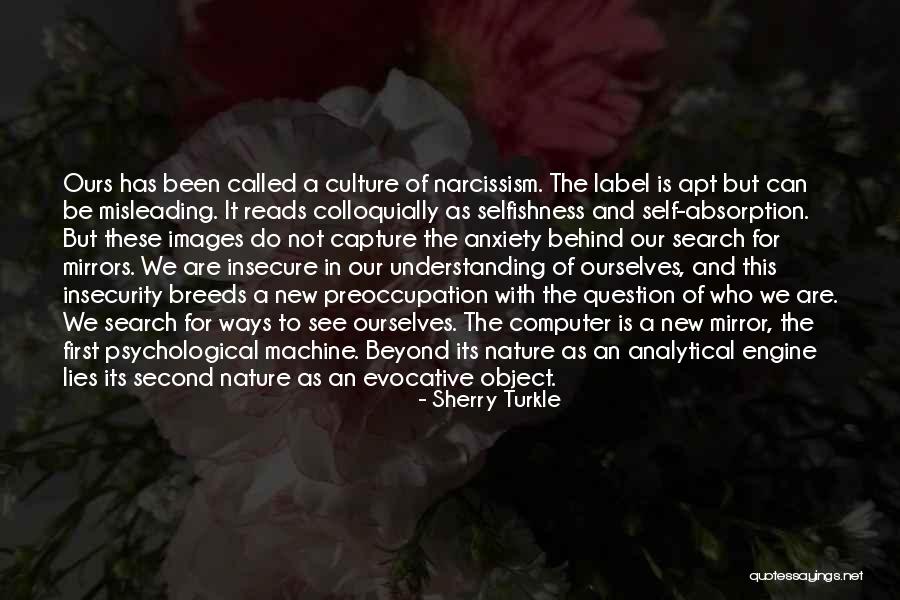
Ours has been called a culture of narcissism. The label is apt but can be misleading. It reads colloquially as selfishness and self-absorption. But these images do not capture the anxiety behind our search for mirrors. We are insecure in our understanding of ourselves, and this insecurity breeds a new preoccupation with the question of who we are. We search for ways to see ourselves. The computer is a new mirror, the first psychological machine. Beyond its nature as an analytical engine lies its second nature as an evocative object. — Sherry Turkle
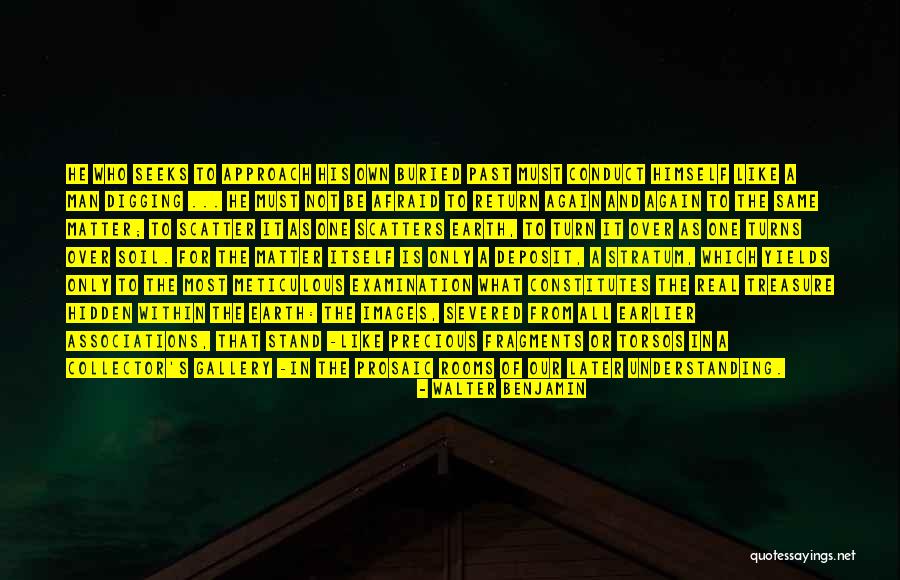
He who seeks to approach his own buried past must conduct himself like a man digging ... He must not be afraid to return again and again to the same matter; to scatter it as one scatters earth, to turn it over as one turns over soil. For the matter itself is only a deposit, a stratum, which yields only to the most meticulous examination what constitutes the real treasure hidden within the earth: the images, severed from all earlier associations, that stand -like precious fragments or torsos in a collector's gallery -in the prosaic rooms of our later understanding. — Walter Benjamin
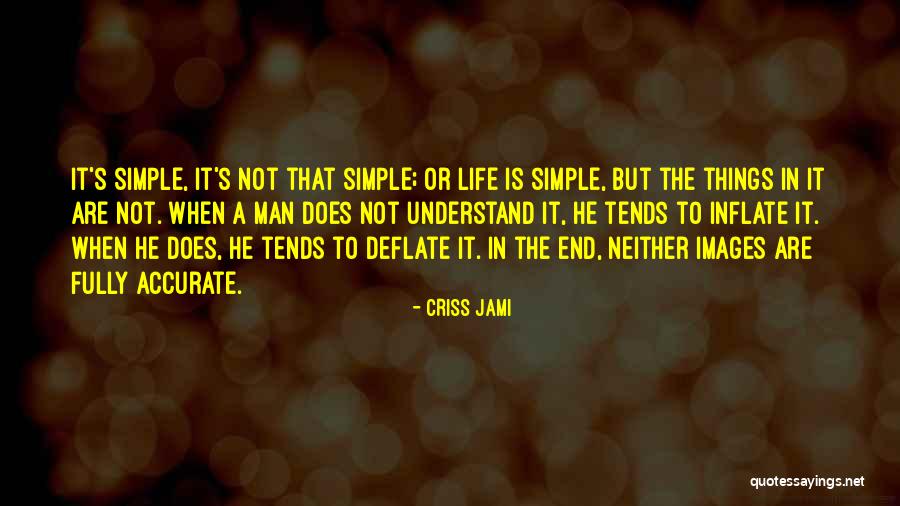
It's simple, it's not that simple; or life is simple, but the things in it are not. When a man does not understand it, he tends to inflate it. When he does, he tends to deflate it. In the end, neither images are fully accurate. — Criss Jami
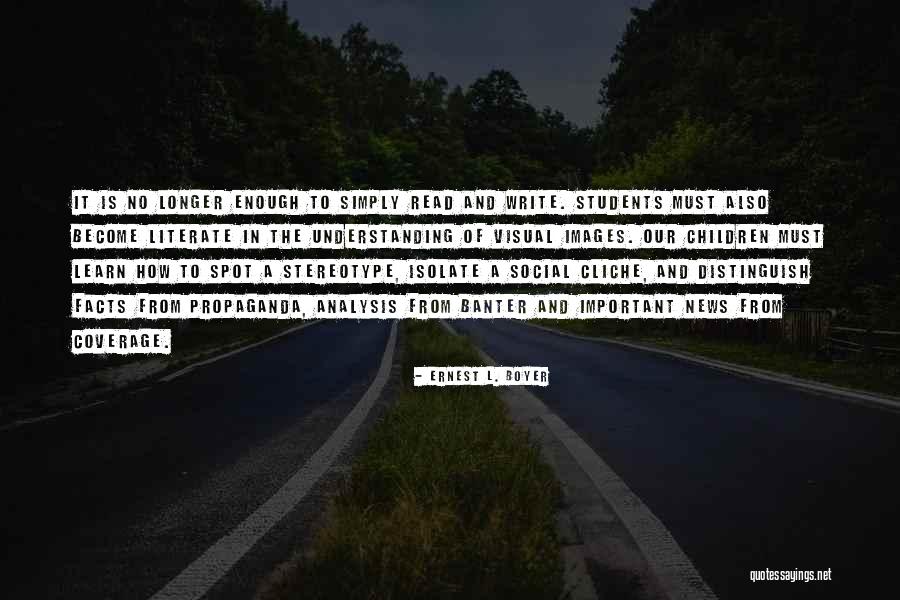
It is no longer enough to simply read and write. Students must also become literate in the understanding of visual images. Our children must learn how to spot a stereotype, isolate a social cliche, and distinguish facts from propaganda, analysis from banter and important news from coverage. — Ernest L. Boyer
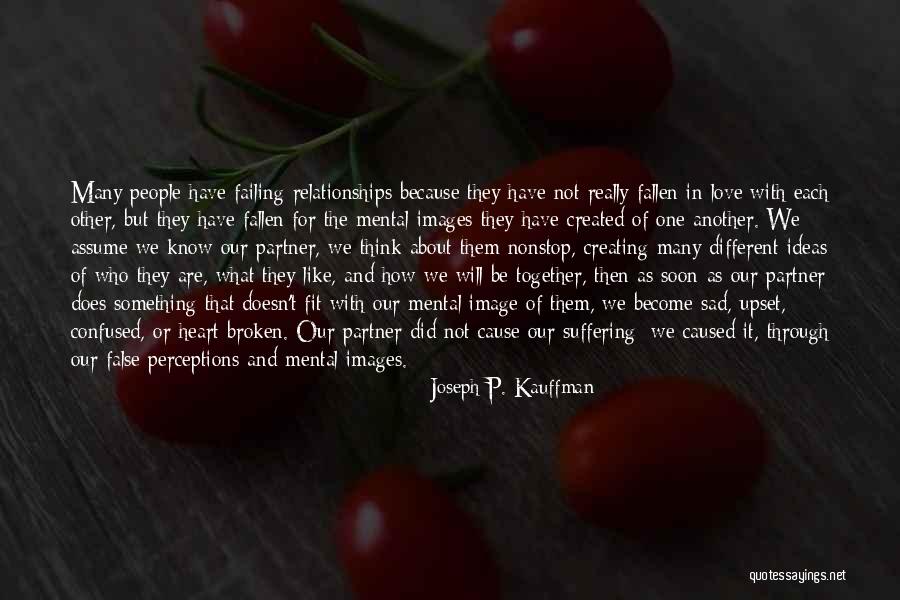
Many people have failing relationships because they have not really fallen in love with each other, but they have fallen for the mental images they have created of one another. We assume we know our partner, we think about them nonstop, creating many different ideas of who they are, what they like, and how we will be together, then as soon as our partner does something that doesn't fit with our mental image of them, we become sad, upset, confused, or heart broken. Our partner did not cause our suffering; we caused it, through our false perceptions and mental images. — Joseph P. Kauffman
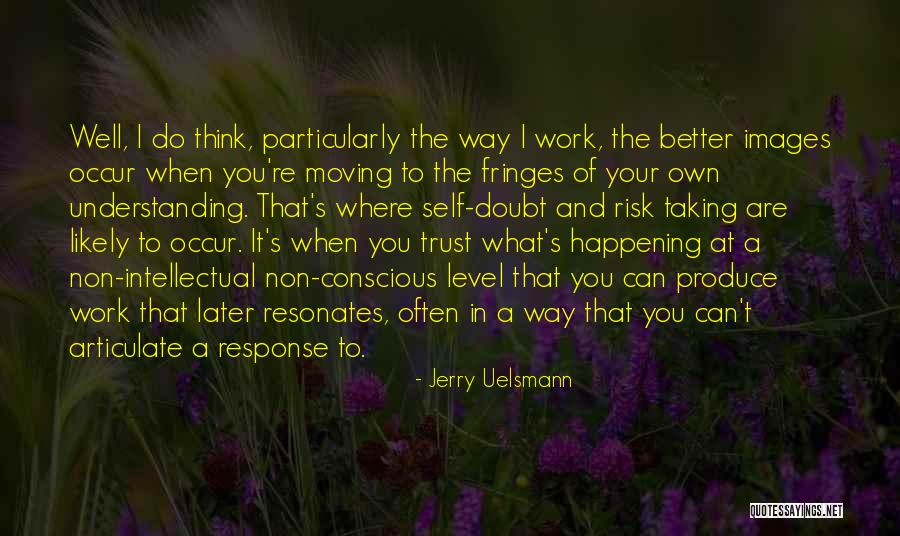
Well, I do think, particularly the way I work, the better images occur when you're moving to the fringes of your own understanding. That's where self-doubt and risk taking are likely to occur. It's when you trust what's happening at a non-intellectual non-conscious level that you can produce work that later resonates, often in a way that you can't articulate a response to. — Jerry Uelsmann
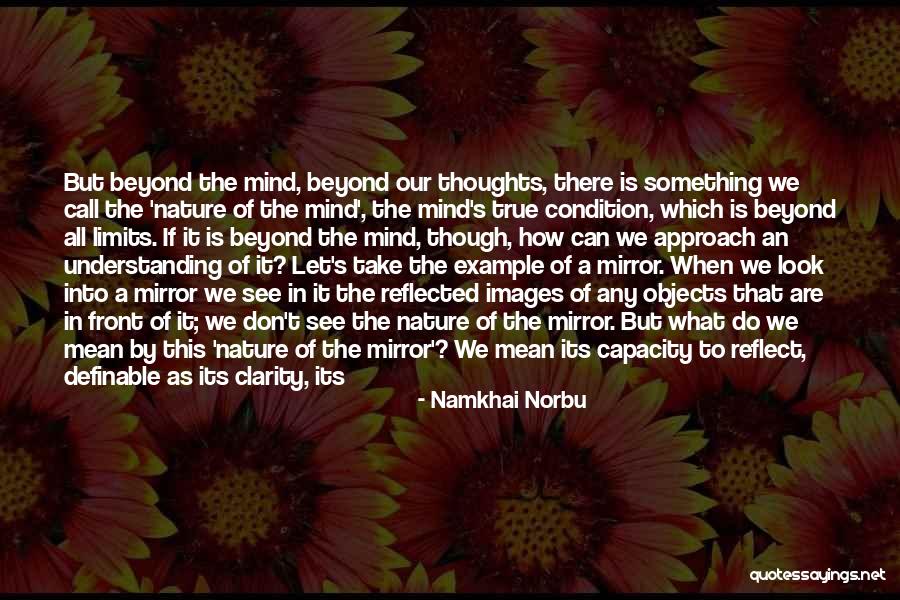
But beyond the mind, beyond our thoughts, there is something we call the 'nature of the mind', the mind's true condition, which is beyond all limits. If it is beyond the mind, though, how can we approach an understanding of it?
Let's take the example of a mirror. When we look into a mirror we see in it the reflected images of any objects that are in front of it; we don't see the nature of the mirror. But what do we mean by this 'nature of the mirror'? We mean its capacity to reflect, definable as its clarity, its purity, and its limpidity, which are indispensable conditions for the manifestation of reflections. This 'nature of the mirror' is not something visible, and the only way we can conceive of it is through the images reflected in the mirror. In the same way, we only know and have concrete experience of that which is relative to our condition of body, voice, and mind. But this itself is the way to understand their true nature. — Namkhai Norbu
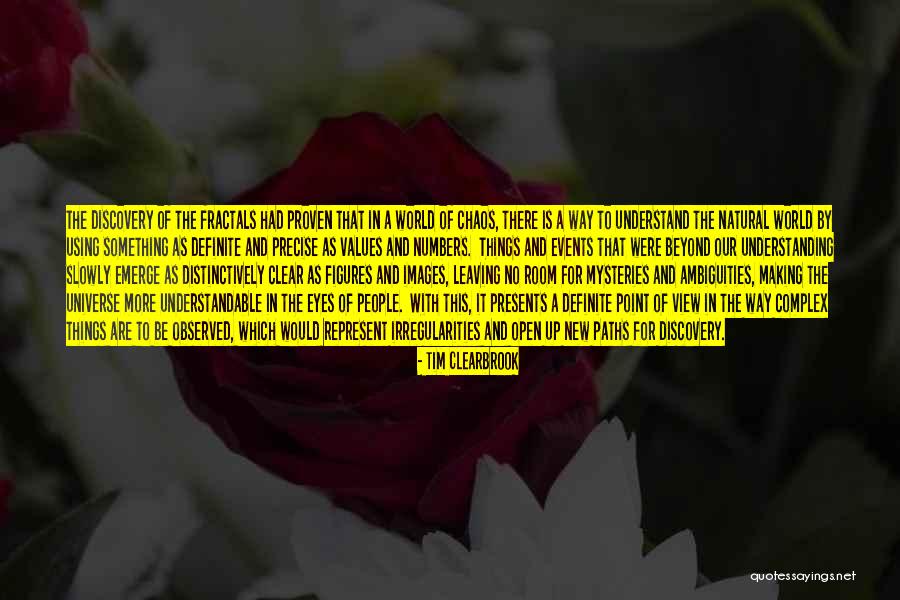
The discovery of the fractals had proven that in a world of chaos, there is a way to understand the natural world by using something as definite and precise as values and numbers. Things and events that were beyond our understanding slowly emerge as distinctively clear as figures and images, leaving no room for mysteries and ambiguities, making the universe more understandable in the eyes of people. With this, it presents a definite point of view in the way complex things are to be observed, which would represent irregularities and open up new paths for discovery. — Tim Clearbrook
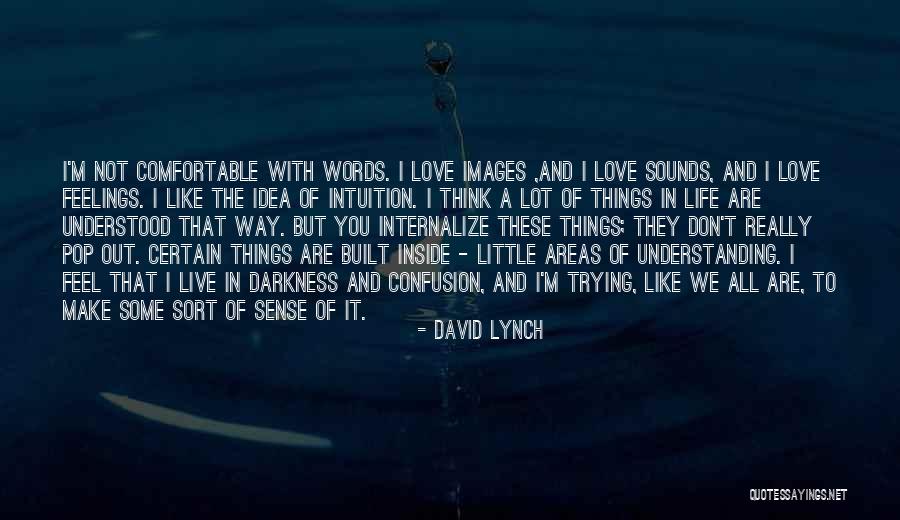
I'm not comfortable with words. I love images ,and I love sounds, and I love feelings. I like the idea of intuition. I think a lot of things in life are understood that way. But you internalize these things; they don't really pop out. Certain things are built inside - little areas of understanding. I feel that I live in darkness and confusion, and I'm trying, like we all are, to make some sort of sense of it. — David Lynch
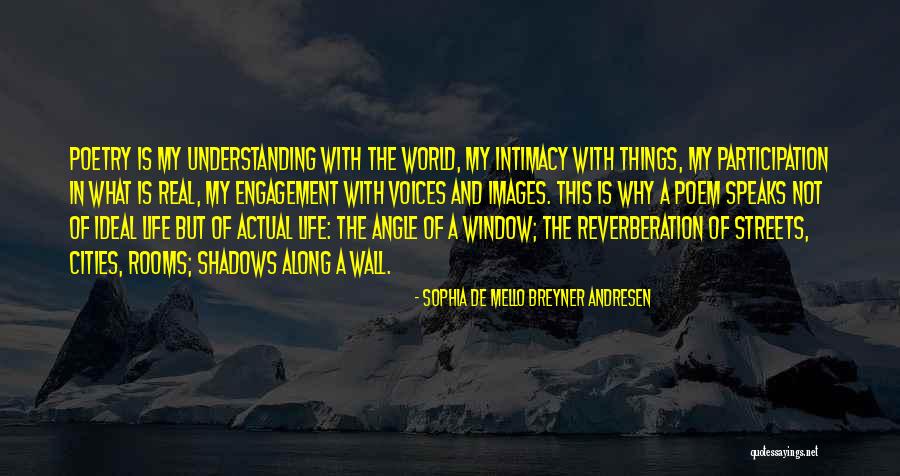
Poetry is my understanding with the world, my intimacy with things, my participation in what is real, my engagement with voices and images. This is why a poem speaks not of ideal life but of actual life: the angle of a window; the reverberation of streets, cities, rooms; shadows along a wall. — Sophia De Mello Breyner Andresen
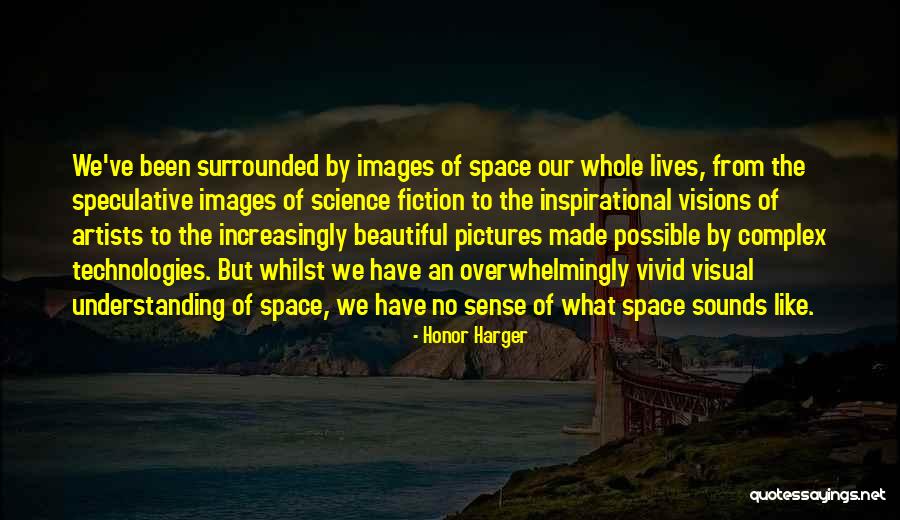
We've been surrounded by images of space our whole lives, from the speculative images of science fiction to the inspirational visions of artists to the increasingly beautiful pictures made possible by complex technologies. But whilst we have an overwhelmingly vivid visual understanding of space, we have no sense of what space sounds like. — Honor Harger
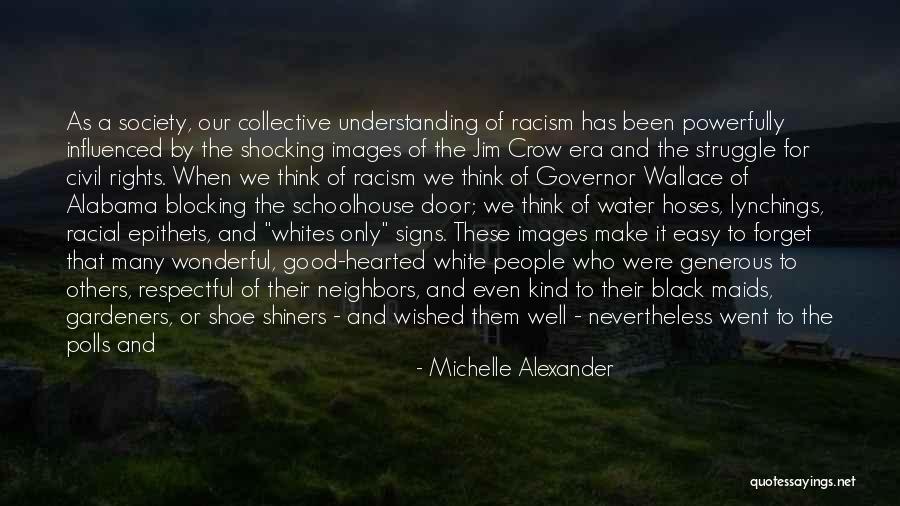
As a society, our collective understanding of racism has been powerfully influenced by the shocking images of the Jim Crow era and the struggle for civil rights. When we think of racism we think of Governor Wallace of Alabama blocking the schoolhouse door; we think of water hoses, lynchings, racial epithets, and "whites only" signs. These images make it easy to forget that many wonderful, good-hearted white people who were generous to others, respectful of their neighbors, and even kind to their black maids, gardeners, or shoe shiners - and wished them well - nevertheless went to the polls and voted for racial segregation. — Michelle Alexander
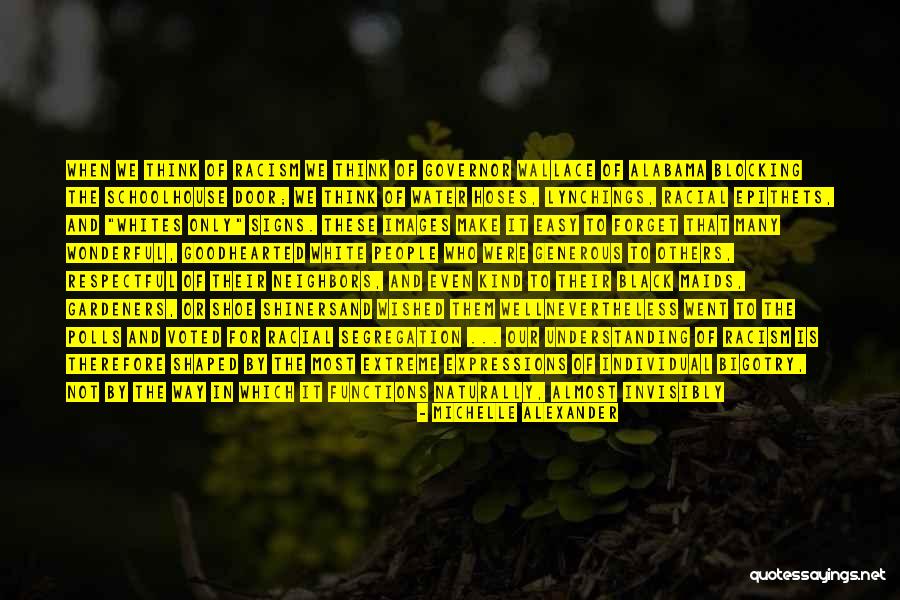
When we think of racism we think of Governor Wallace of Alabama blocking the schoolhouse door; we think of water hoses, lynchings, racial epithets, and "whites only" signs. These images make it easy to forget that many wonderful, goodhearted white people who were generous to others, respectful of their neighbors, and even kind to their black maids, gardeners, or shoe shiners
and wished them well
nevertheless went to the polls and voted for racial segregation ... Our understanding of racism is therefore shaped by the most extreme expressions of individual bigotry, not by the way in which it functions naturally, almost invisibly (and sometimes with genuinely benign intent), when it is embedded in the structure of a social system. — Michelle Alexander
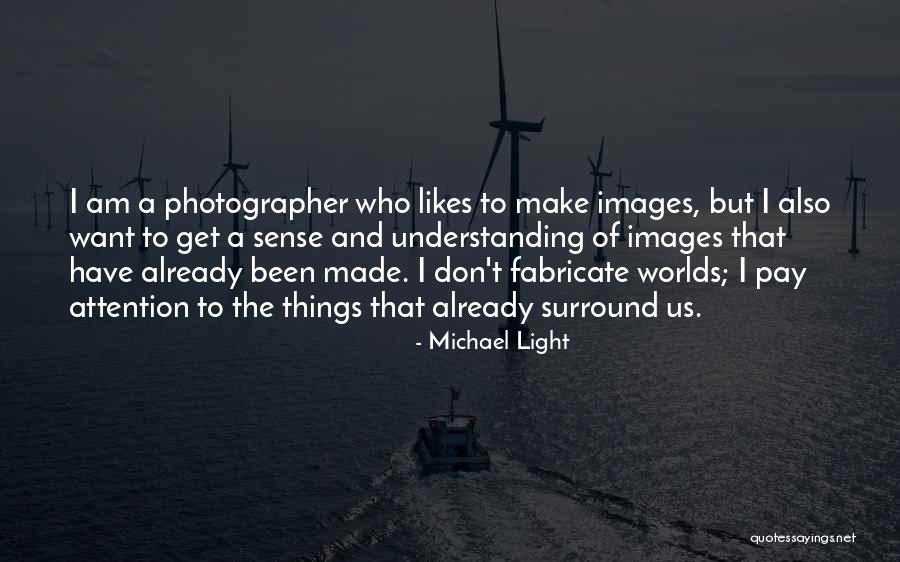
I am a photographer who likes to make images, but I also want to get a sense and understanding of images that have already been made. I don't fabricate worlds; I pay attention to the things that already surround us. — Michael Light
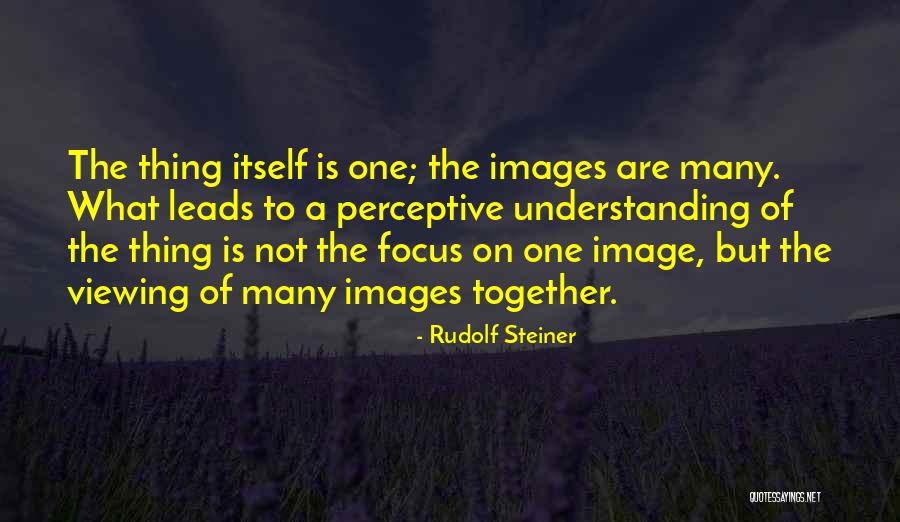
The thing itself is one; the images are many. What leads to a perceptive understanding of the thing is not the focus on one image, but the viewing of many images together. — Rudolf Steiner
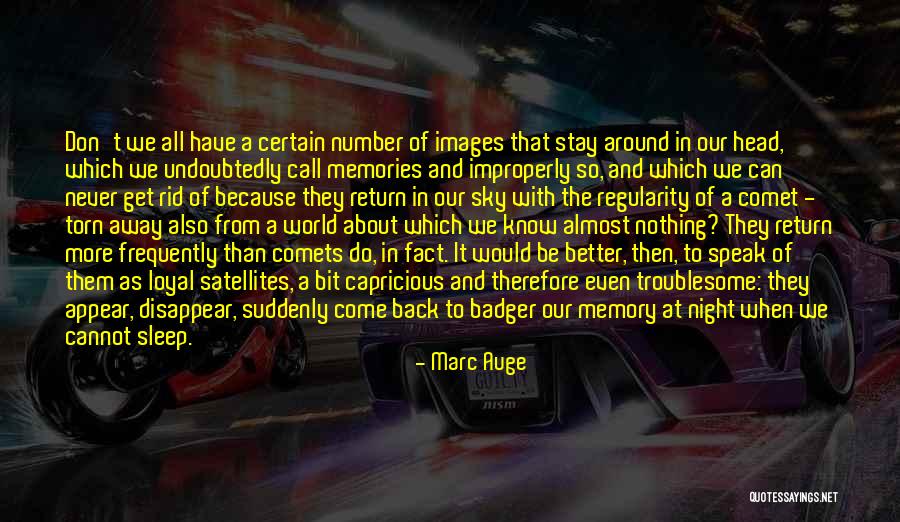
Don't we all have a certain number of images that stay around in our head, which we undoubtedly call memories and improperly so, and which we can never get rid of because they return in our sky with the regularity of a comet - torn away also from a world about which we know almost nothing? They return more frequently than comets do, in fact. It would be better, then, to speak of them as loyal satellites, a bit capricious and therefore even troublesome: they appear, disappear, suddenly come back to badger our memory at night when we cannot sleep. But, little as we may care to, as our hearts tell us to, we can also observe them at will, coldly, scrutinize their shadows, colors, and relief. Only, they are dead stars: from them we shall never grasp anything other than the certainty that we have already seen them, examined them, questioned them without really understanding the laws that the line of their mysterious orbits obeyed. — Marc Auge
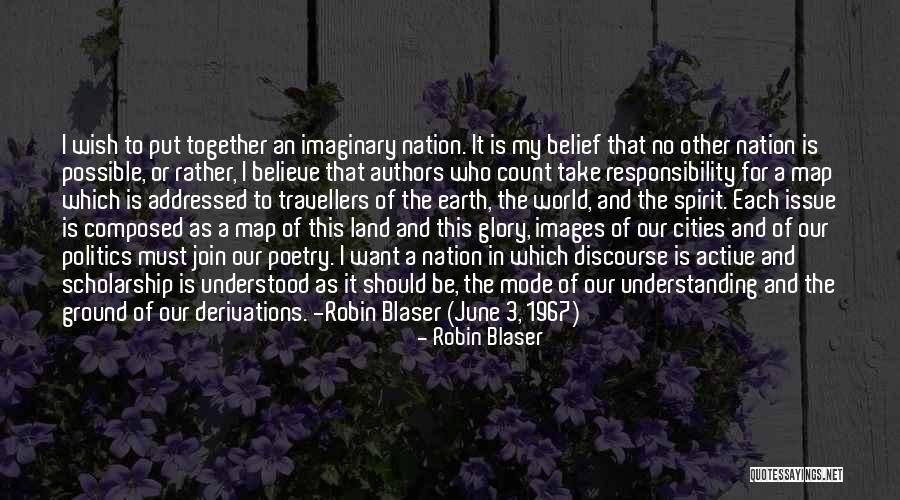
I wish to put together an imaginary nation. It is my belief that no other nation is possible, or rather, I believe that authors who count take responsibility for a map which is addressed to travellers of the earth, the world, and the spirit. Each issue is composed as a map of this land and this glory, images of our cities and of our politics must join our poetry. I want a nation in which discourse is active and scholarship is understood as it should be, the mode of our understanding and the ground of our derivations.
-Robin Blaser (June 3, 1967) — Robin Blaser
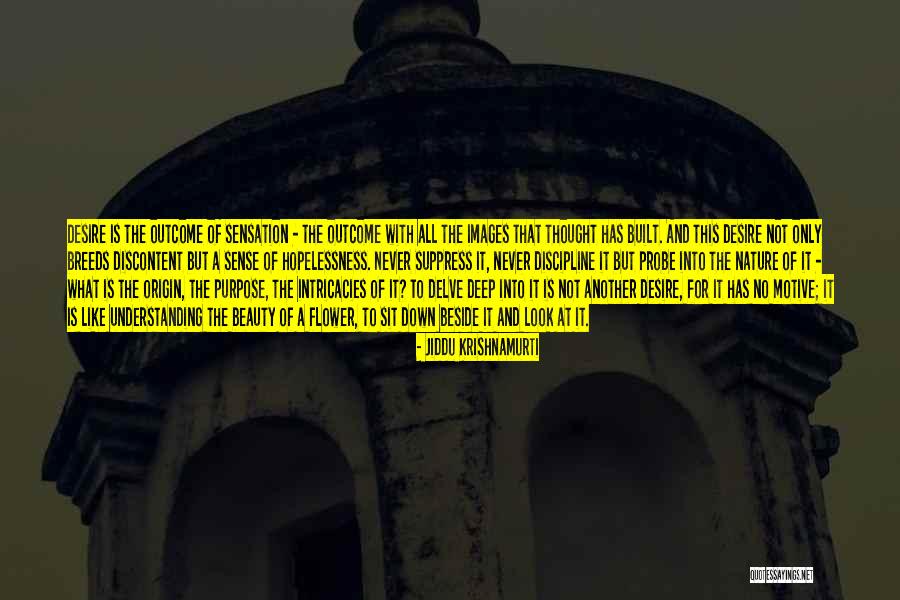
Desire is the outcome of sensation - the outcome with all the images that thought has built. And this desire not only breeds discontent but a sense of hopelessness.
Never suppress it, never discipline it but probe into the nature of it - what is the origin, the purpose, the intricacies of it? To delve deep into it is not another desire, for it has no motive; it is like understanding the beauty of a flower, to sit down beside it and look at it. — Jiddu Krishnamurti
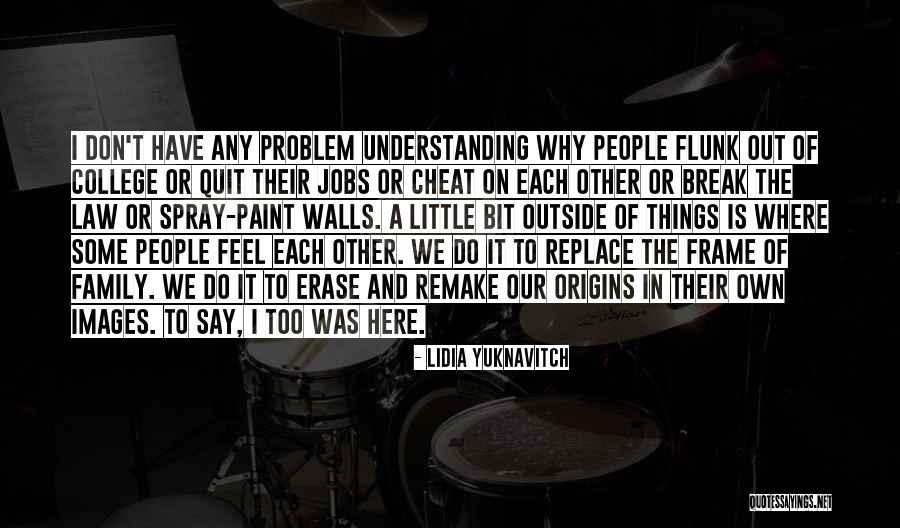
I don't have any problem understanding why people flunk out of college or quit their jobs or cheat on each other or break the law or spray-paint walls. A little bit outside of things is where some people feel each other. We do it to replace the frame of family. We do it to erase and remake our origins in their own images. To say, I too was here. — Lidia Yuknavitch
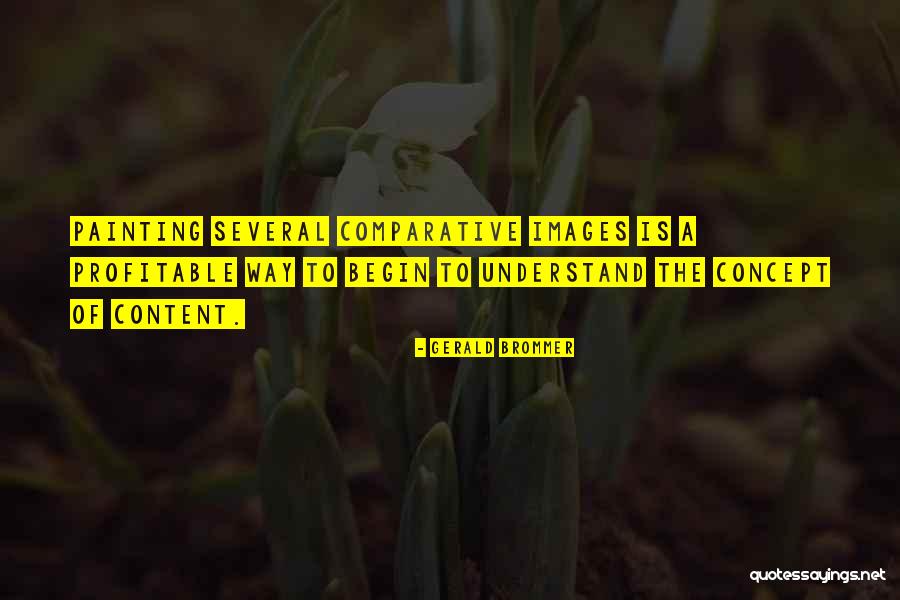
Painting several comparative images is a profitable way to begin to understand the concept of content. — Gerald Brommer
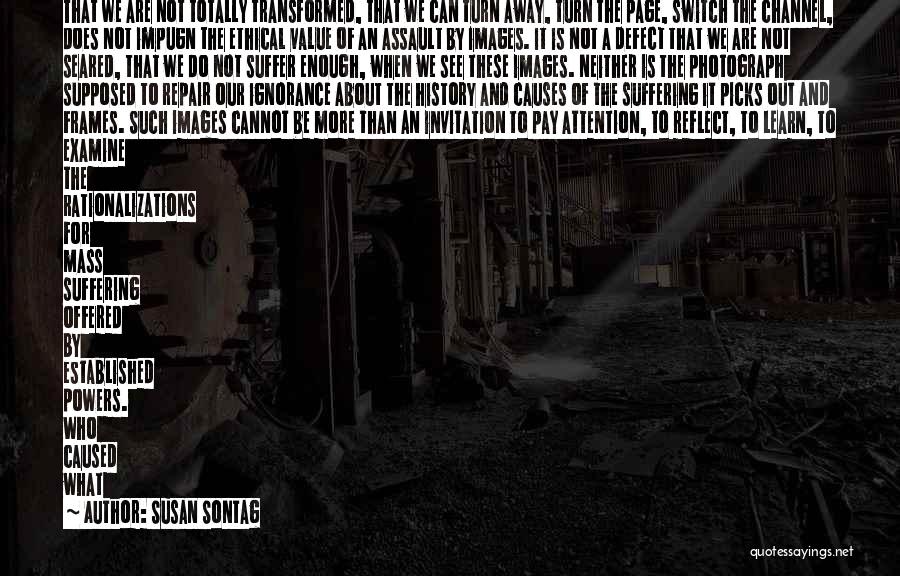
That we are not totally transformed, that we can turn away, turn the page, switch the channel, does not impugn the ethical value of an assault by images. It is not a defect that we are not seared, that we do not suffer enough, when we see these images. Neither is the photograph supposed to repair our ignorance about the history and causes of the suffering it picks out and frames. Such images cannot be more than an invitation to pay attention, to reflect, to learn, to examine the rationalizations for mass suffering offered by established powers. Who caused what the picture shows? Who is responsible? Is it excusable? Was it inevitable? Is there some state of affairs which we have accepted up to now that ought to be challenged? All this, with the understanding that moral indignation, like compassion, cannot dictate a course of action. — Susan Sontag
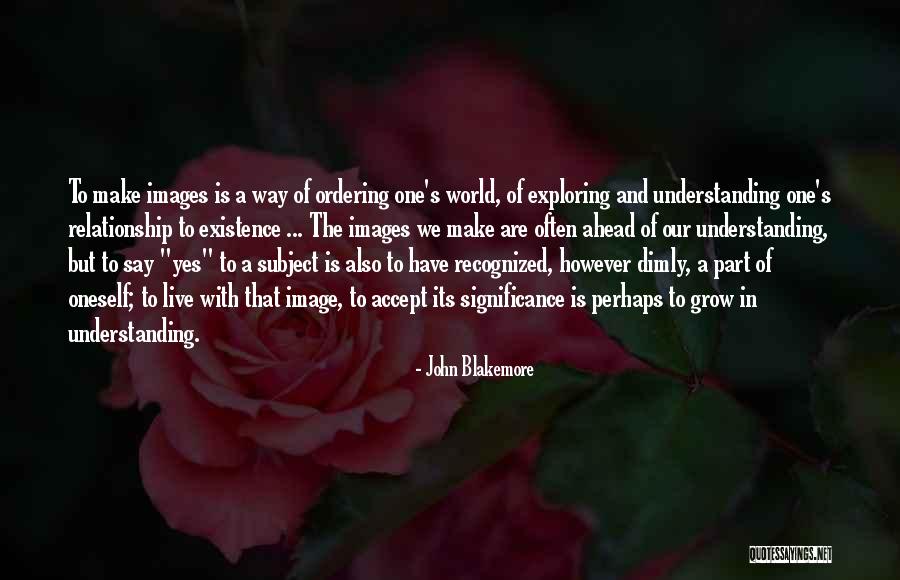
To make images is a way of ordering one's world, of exploring and understanding one's relationship to existence ... The images we make are often ahead of our understanding, but to say "yes" to a subject is also to have recognized, however dimly, a part of oneself; to live with that image, to accept its significance is perhaps to grow in understanding. — John Blakemore
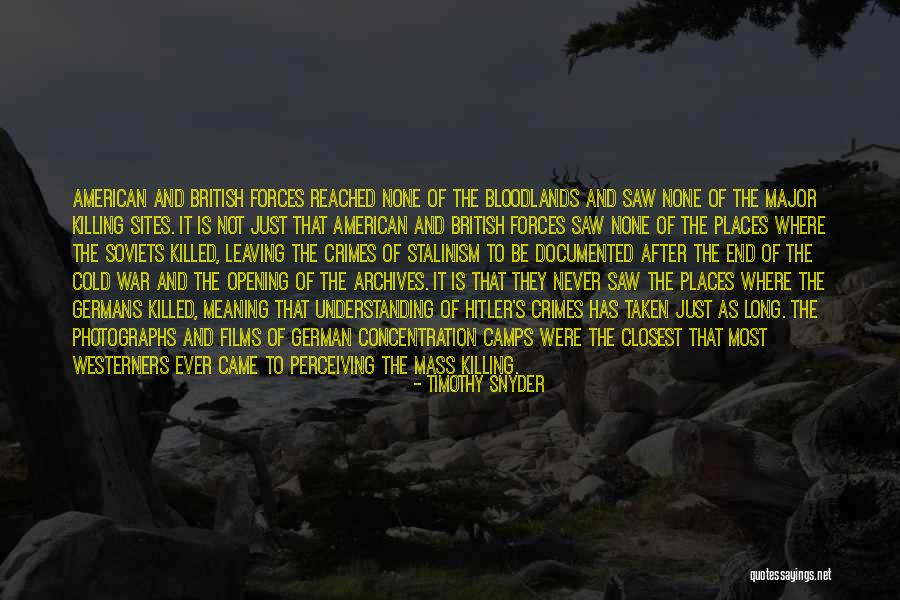
American and British forces reached none of the bloodlands and saw none of the major killing sites. It is not just that American and British forces saw none of the places where the Soviets killed, leaving the crimes of Stalinism to be documented after the end of the Cold War and the opening of the archives. It is that they never saw the places where the Germans killed, meaning that understanding of Hitler's crimes has taken just as long. The photographs and films of German concentration camps were the closest that most westerners ever came to perceiving the mass killing. Horrible though these images were, they were only hints at the history of the bloodlands. They are not the whole story; sadly, they are not even an introduction. — Timothy Snyder
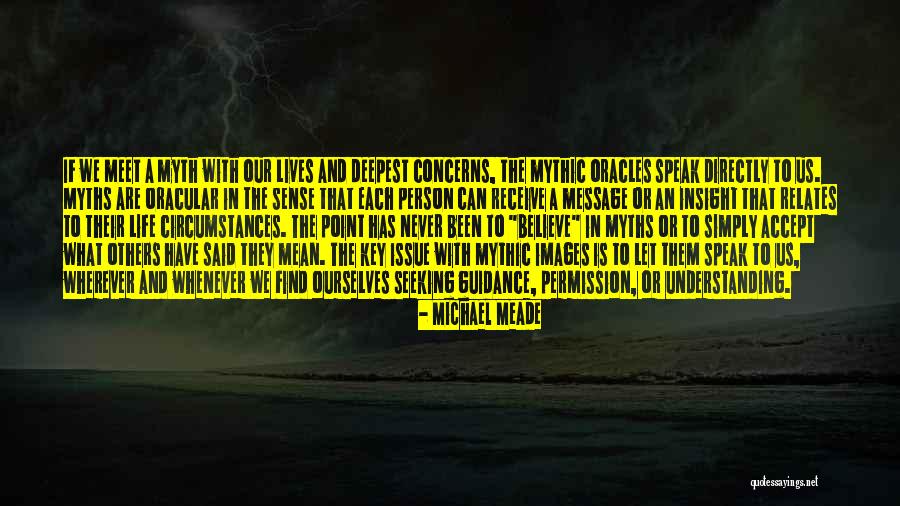
If we meet a myth with our lives and deepest concerns, the mythic oracles speak directly to us. Myths are oracular in the sense that each person can receive a message or an insight that relates to their life circumstances. The point has never been to "believe" in myths or to simply accept what others have said they mean. The key issue with mythic images is to let them speak to us, wherever and whenever we find ourselves seeking guidance, permission, or understanding. — Michael Meade
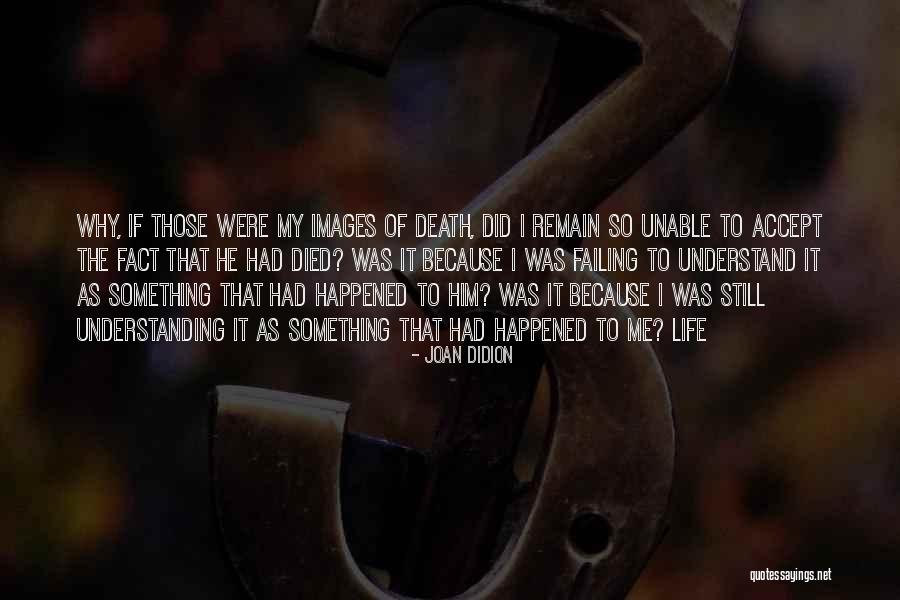
Why, if those were my images of death, did I remain so unable to accept the fact that he had died? Was it because I was failing to understand it as something that had happened to him? Was it because I was still understanding it as something that had happened to me? Life — Joan Didion
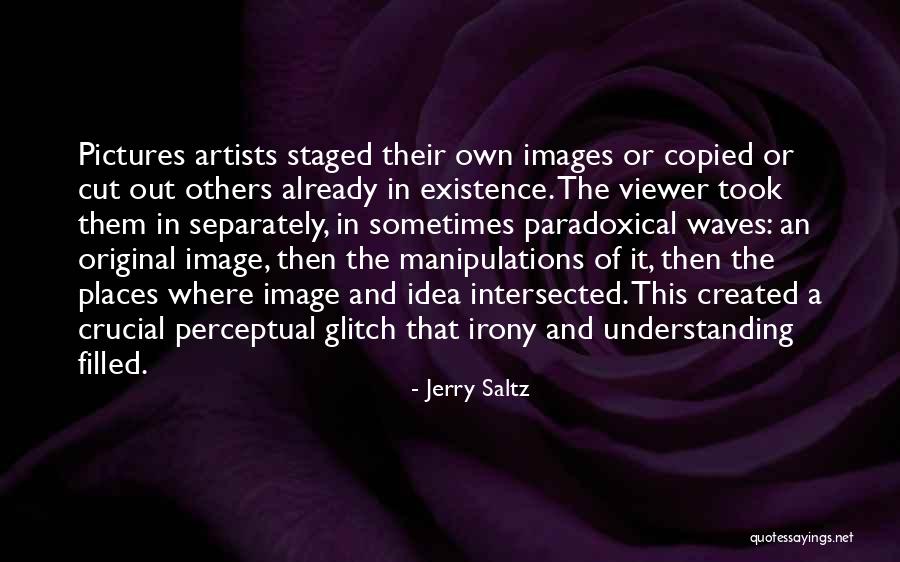
Pictures artists staged their own images or copied or cut out others already in existence. The viewer took them in separately, in sometimes paradoxical waves: an original image, then the manipulations of it, then the places where image and idea intersected. This created a crucial perceptual glitch that irony and understanding filled. — Jerry Saltz
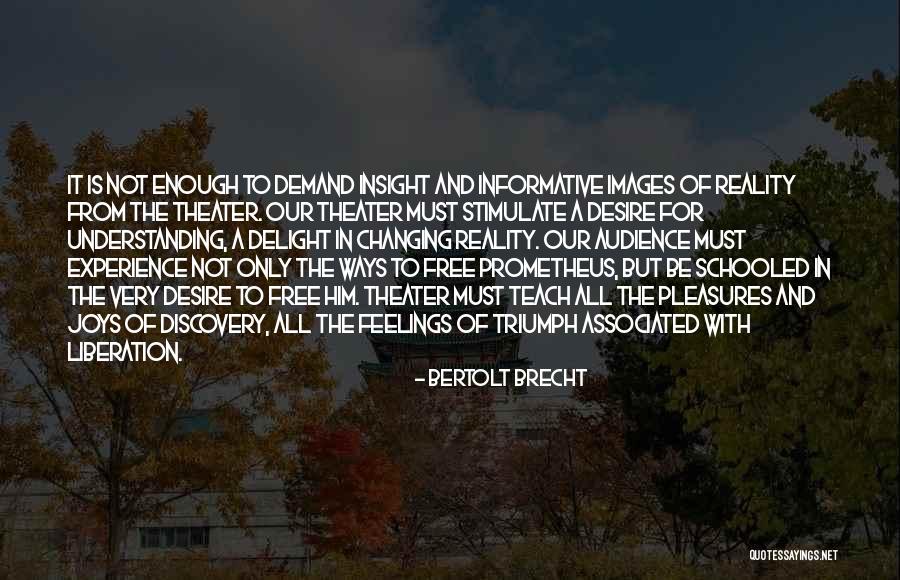
It is not enough to demand insight and informative images of reality from the theater. Our theater must stimulate a desire for understanding, a delight in changing reality. Our audience must experience not only the ways to free Prometheus, but be schooled in the very desire to free him. Theater must teach all the pleasures and joys of discovery, all the feelings of triumph associated with liberation. — Bertolt Brecht
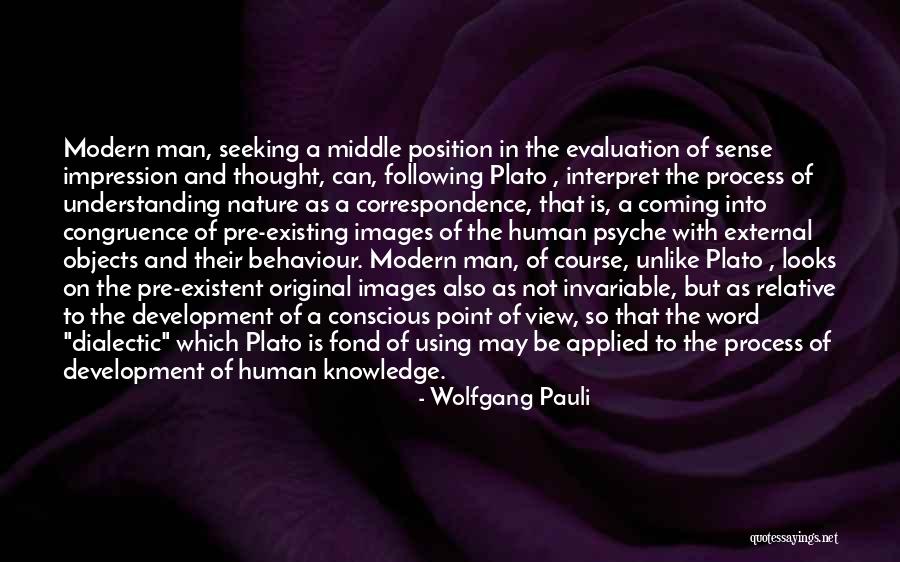
Modern man, seeking a middle position in the evaluation of sense impression and thought, can, following Plato , interpret the process of understanding nature as a correspondence, that is, a coming into congruence of pre-existing images of the human psyche with external objects and their behaviour. Modern man, of course, unlike Plato , looks on the pre-existent original images also as not invariable, but as relative to the development of a conscious point of view, so that the word "dialectic" which Plato is fond of using may be applied to the process of development of human knowledge. — Wolfgang Pauli

Students who take Latin are more proficient and earn higher scores on the verbal SAT exam. The business world has long recognized the importance of a rich vocabulary and rates it high as evidence of executive potential and success. Understanding the etymological history of a word gives the user vividness, color, punch, and precision. It also seems that the clearer and more numerous our verbal images, the greater our intellectual power. Wheelock's Latin is profuse with the etymological study of English and vocabulary enrichment. Our own experiences have shown that students will not only remember vocabulary words longer and better when they understand their etymologies, but also will use them with a sharper sense of meaning and nuance. — Frederic M. Wheelock
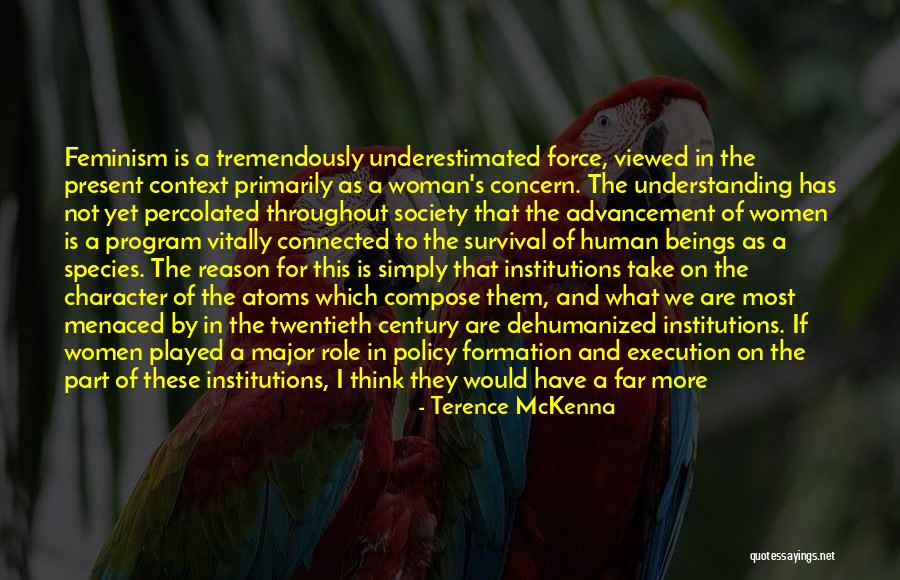
Feminism is a tremendously underestimated force, viewed in the present context primarily as a woman's concern. The understanding has not yet percolated throughout society that the advancement of women is a program vitally connected to the survival of human beings as a species. The reason for this is simply that institutions take on the character of the atoms which compose them, and what we are most menaced by in the twentieth century are dehumanized institutions. If women played a major role in policy formation and execution on the part of these institutions, I think they would have a far more benign and ecologically sensitive kind of character. So I see feminism not as a kind of war between the sexes or any of these stereotypic images, but as actually a kind of effort to shift the ratios of our emphasis that is expressed through our institutions. — Terence McKenna
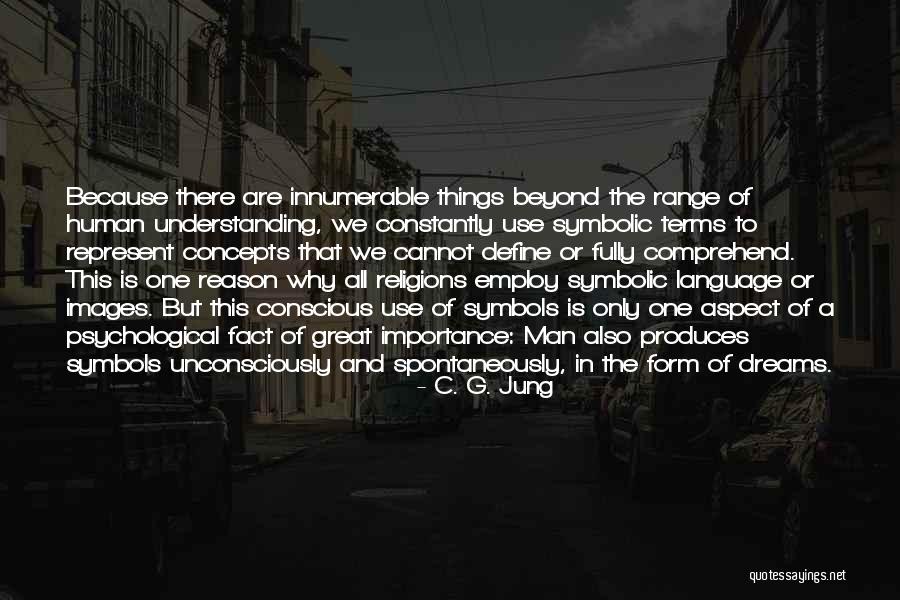
Because there are innumerable things beyond the range of human understanding, we constantly use symbolic terms to represent concepts that we cannot define or fully comprehend. This is one reason why all religions employ symbolic language or images. But this conscious use of symbols is only one aspect of a psychological fact of great importance: Man also produces symbols unconsciously and spontaneously, in the form of dreams. — C. G. Jung
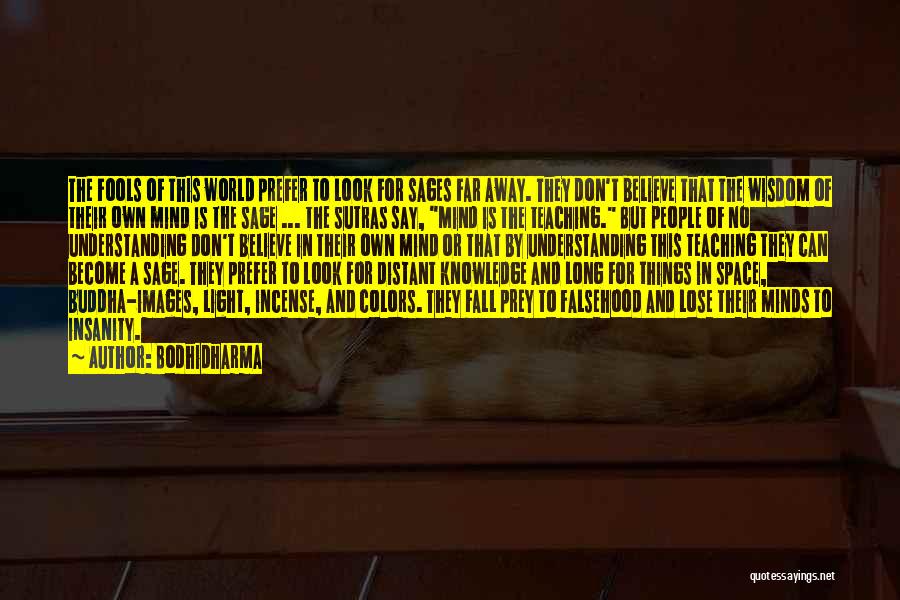
The fools of this world prefer to look for sages far away. They don't believe that the wisdom of their own mind is the sage ... the sutras say, "Mind is the teaching." But people of no understanding don't believe in their own mind or that by understanding this teaching they can become a sage. They prefer to look for distant knowledge and long for things in space, buddha-images, light, incense, and colors. They fall prey to falsehood and lose their minds to insanity. — Bodhidharma
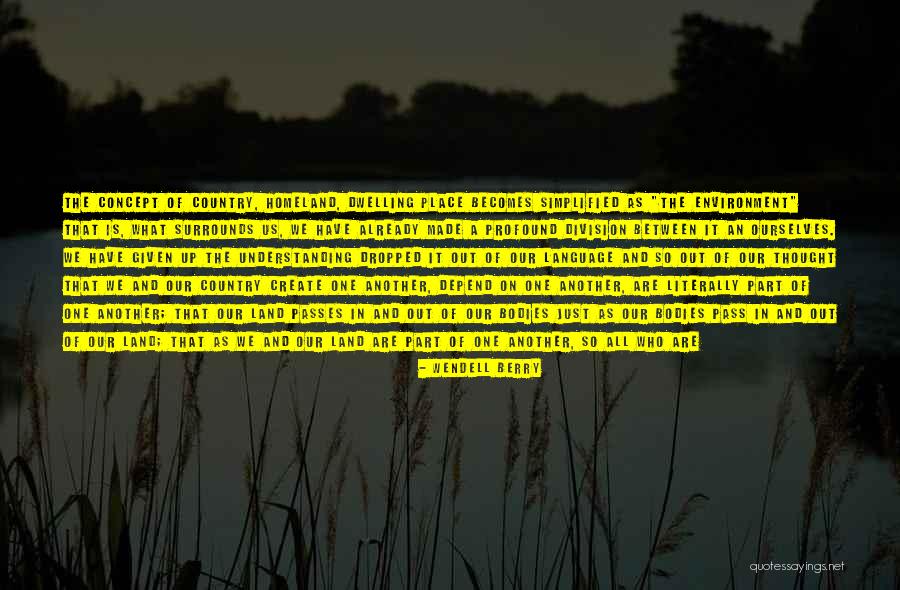
The concept of country, homeland, dwelling place becomes simplified as "the environment"
that is, what surrounds us, we have already made a profound division between it an ourselves. We have given up the understanding
dropped it out of our language and so out of our thought
that we and our country create one another, depend on one another, are literally part of one another; that our land passes in and out of our bodies just as our bodies pass in and out of our land; that as we and our land are part of one another, so all who are living as neighbors here, human and plant and animal, are part of one another, and so cannot possibly flourish alone; that, therefore, our culture must be our response to our place, our culture and our place are images of each other and inseparable from each other, and so neither can be better than they other. — Wendell Berry
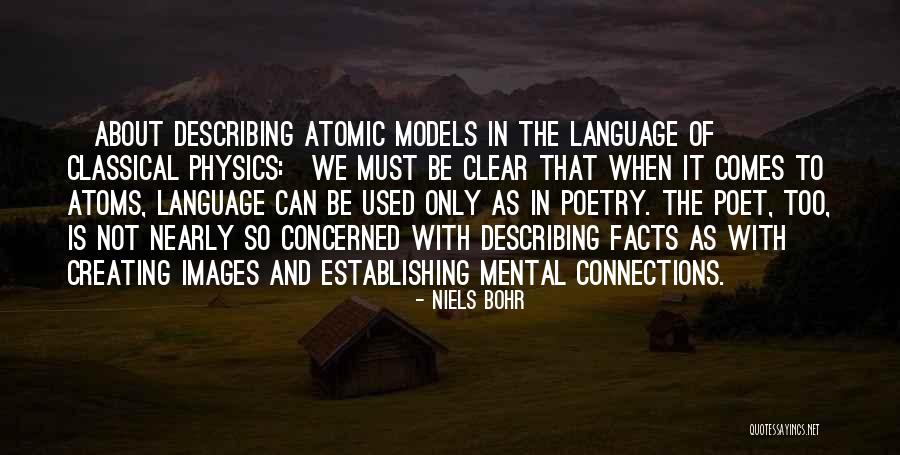
[About describing atomic models in the language of classical physics:]
We must be clear that when it comes to atoms, language can be used only as in poetry. The poet, too, is not nearly so concerned with describing facts as with creating images and establishing mental connections. — Niels Bohr





